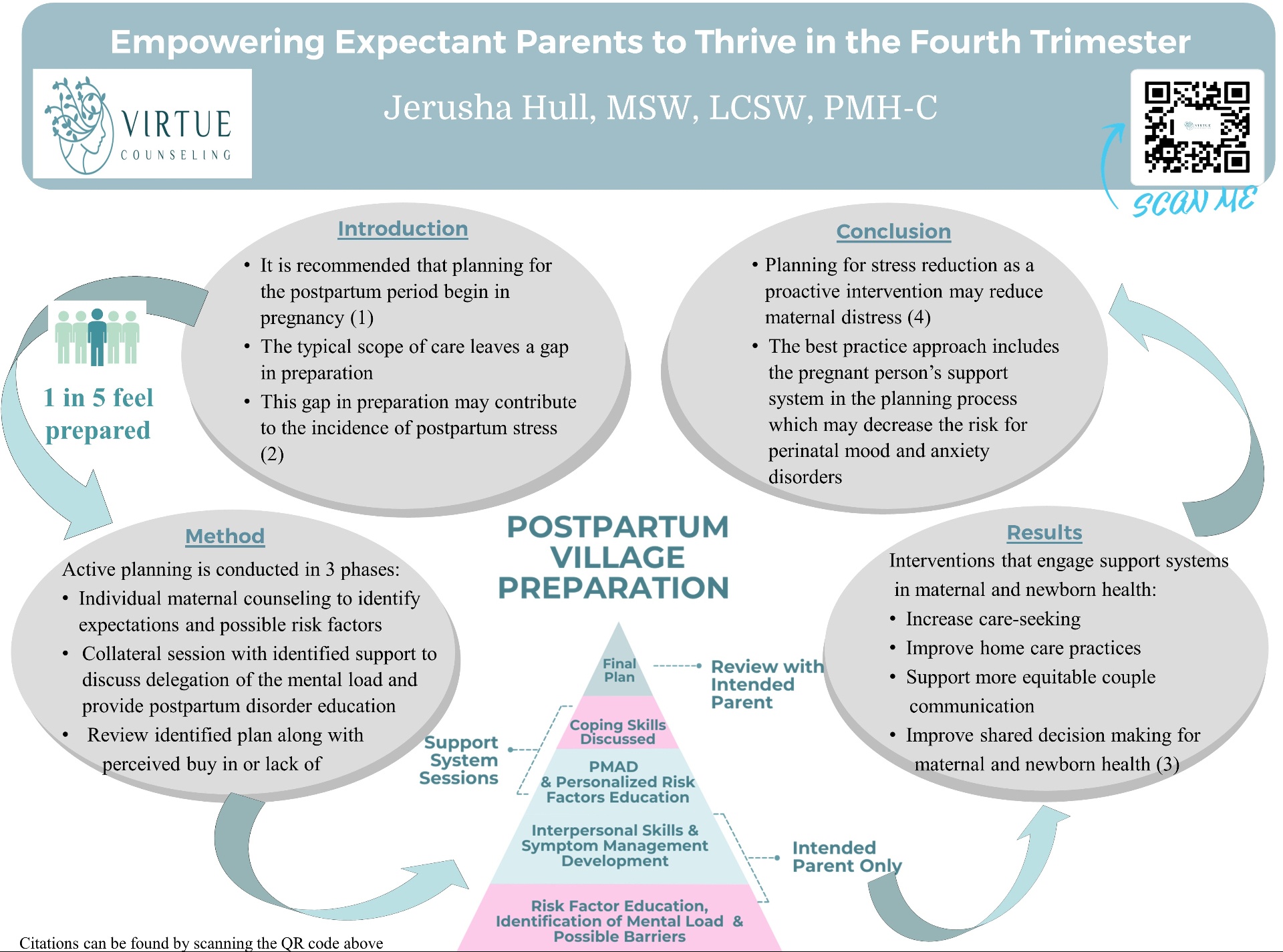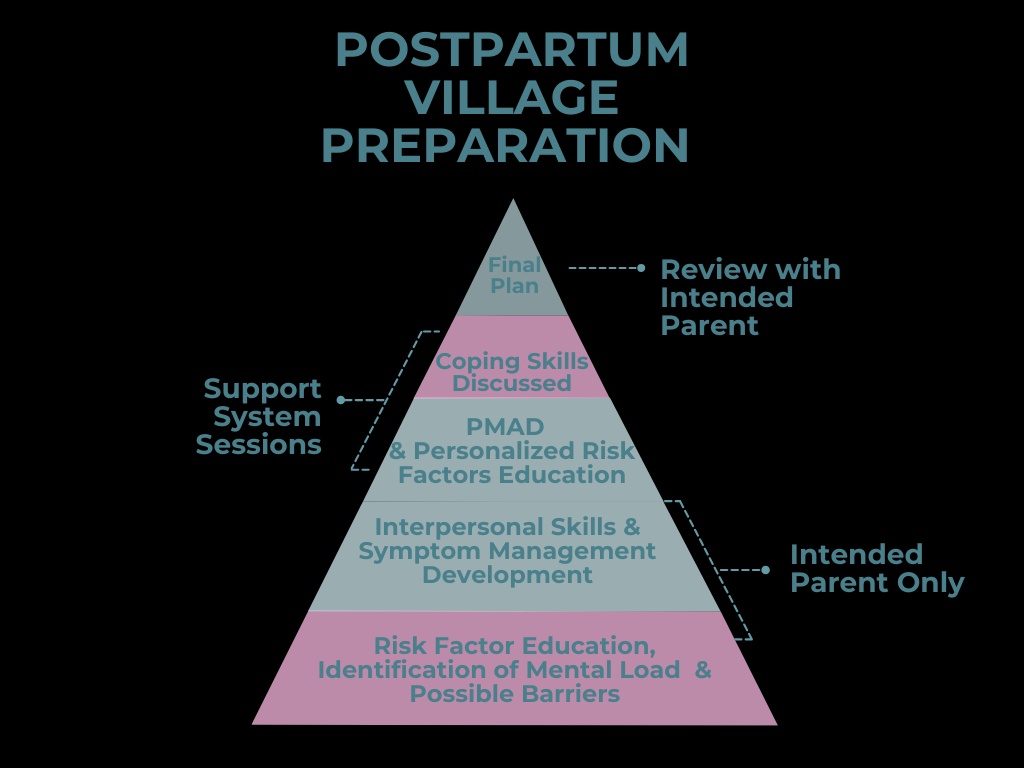Empowering Expectant Parents to Thrive in the Fourth Trimester

Empowering Expectant Parents to Thrive in the Fourth Trimester
By Jerusha Hull, MSW, LCSW, PMH-C
Pregnancy is a journey filled with anticipation and excitement, but it also brings its fair share of challenges and uncertainties, especially when it comes to preparing for the postpartum period. At Virtue Counseling, we believe that the journey doesn’t end with childbirth; it continues into what is called the “Fourth Trimester.” This crucial period can significantly impact both the mother and the newborn’s well-being, making it essential to plan and prepare adequately.
The Importance of Postpartum Planning
It’s recommended that planning for the postpartum period should begin during pregnancy. (1) Unfortunately, the typical scope of prenatal care often leaves a gap in preparation, which can contribute to increased postpartum stress. (2) This stress not only affects the mother’s mental health but can also influence her ability to care for her newborn effectively.
Our approach at Virtue Counseling involves proactive planning to reduce maternal distress. By addressing potential risk factors and preparing for the postpartum period, we aim to empower expectant parents to thrive rather than just survive.
Our Three-Phase Method
To bridge this gap in care, we have developed a comprehensive three-phase method:
Individual Maternal Counseling: We start with personalized counseling sessions to identify the mother’s expectations and any possible risk factors for postpartum mood disorders. This helps in creating a tailored plan that addresses her specific needs.
Collateral Sessions with Support Systems: These sessions involve the mother’s identified support network. We discuss the delegation of mental loads and provide education on postpartum disorders to assist with earlier recognition. This collaborative approach ensures that everyone involved is on the same page and ready to support the mother effectively.
Review and Reinforcement: Finally, we review the identified plan and assess the perceived buy-in from the support network and any additional barriers that were recognized when we met with the mother’s village. This step ensures that the plan is practical and that everyone involved is committed to supporting the mother through the postpartum period.
Positive Outcomes of Engaging Support Systems
Research has shown that engaging support systems in maternal and newborn health has numerous benefits, including:
- Increased care-seeking behavior
- Improved home care practices
- More equitable couple communication
- Enhanced shared decision-making for maternal and newborn health (3)
These interventions can significantly reduce the risk of perinatal mood and anxiety disorders, ensuring a healthier, happier postpartum experience (4).
Conclusion
Planning for the postpartum period is not just about managing stress; it’s about creating an environment where the mother and newborn can thrive. By involving support systems and addressing potential challenges proactively, we can help reduce maternal distress and promote overall well-being.
Virtue Counseling is dedicated to helping expectant parents feel prepared and confident as they transition into the Fourth Trimester. Remember, the best outcomes are achieved when planning starts early and involves the entire support network.
Are you or someone you know expecting a baby and feeling overwhelmed? Contact Virtue Counseling today to start planning for a smooth and stress-free postpartum period. Let us help you build the confidence and support you need to thrive!
For more information, visit Virtue Counseling.
This poster was presented at the Postpartum Support International conference in Washington, DC, 2024.
© 2024 Virtue Counseling, LLC. All rights reserved.
Bibliography
American College of Obstetricians and Gynecologists. (2018, April). ACOG Redesigns Postpartum Care: Emphasizes “the Fourth Trimester.” Retrieved from https://www.acog.org/news/news-releases/2018/04/acog-redesigns-postpartum-care
Brenning, K., & Soenens, B. (2017). A self-determination theory perspective on postpartum depressive symptoms and early parenting behaviors. Journal of Clinical Psychology, 73(12), 1–15. 10.1002/jclp.22480 [PubMed] [CrossRef] [Google Scholar] and Clout, D., & Brown, R. (2015). Sociodemographic, pregnancy, obstetric, and postnatal predictors of postpartum stress, anxiety, and depression in new mothers. Journal of Affective Disorders, 188, 60–67. 10.1016/j.jad.2015.08.054 [PubMed] [CrossRef] [Google Scholar]
Tokhi, M., Comrie-Thomson, L., Davis, J., Portela, A., Chersich, M., & Luchters, S. (2018). Involving men to improve maternal and newborn health: A systematic review of the effectiveness of interventions. PLoS ONE, 13(1), Article e0191620. https://doi.org/10.1371/journal.pone.0191620
Summerfeldt, J. (2018). How childbirth-related stress may be contributing to increased postpartum disorders in new mothers. Midwifery Today, 126, 51–53. Retrieved from https://midwiferytoday.com/mt-articles/how-childbirth-related-stress-may-be-contributing-to-increased-postpartum-mood-disorders-in-new-mothers-suggestions-for-midwives/

